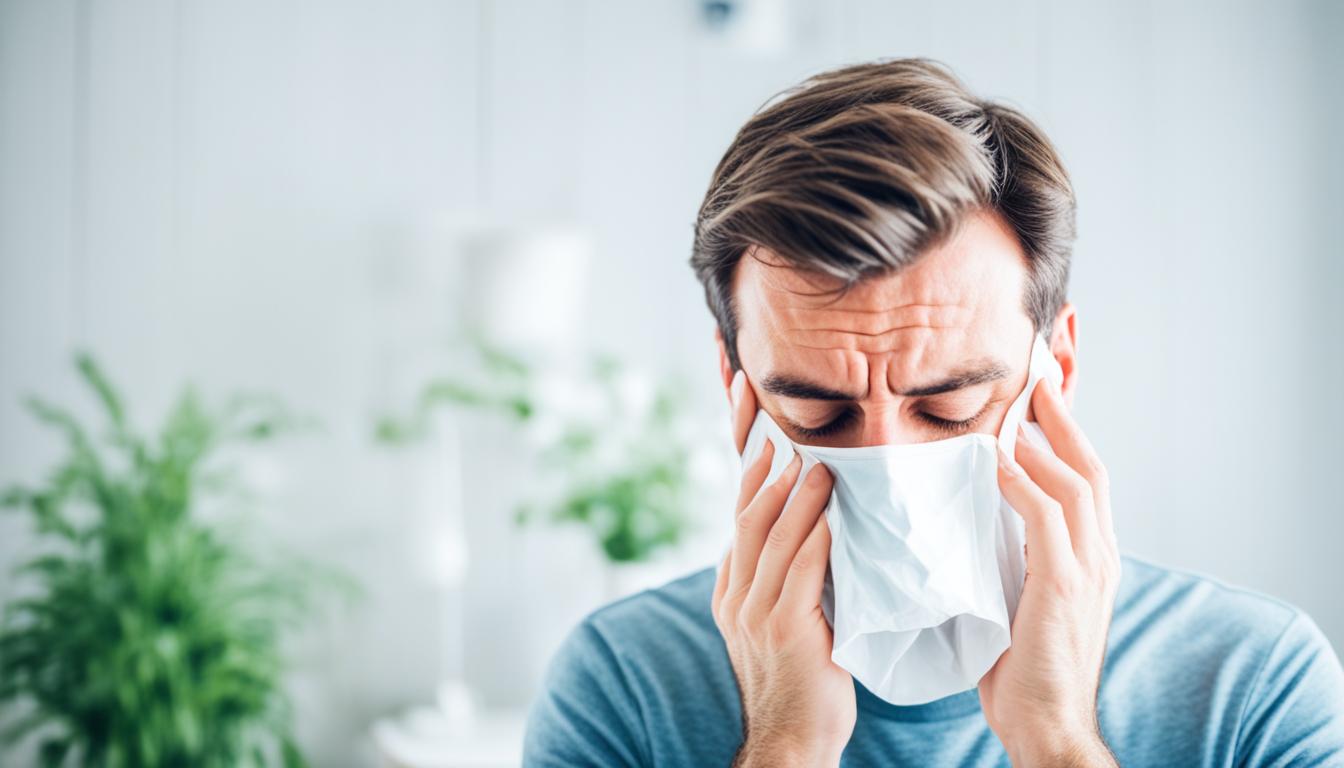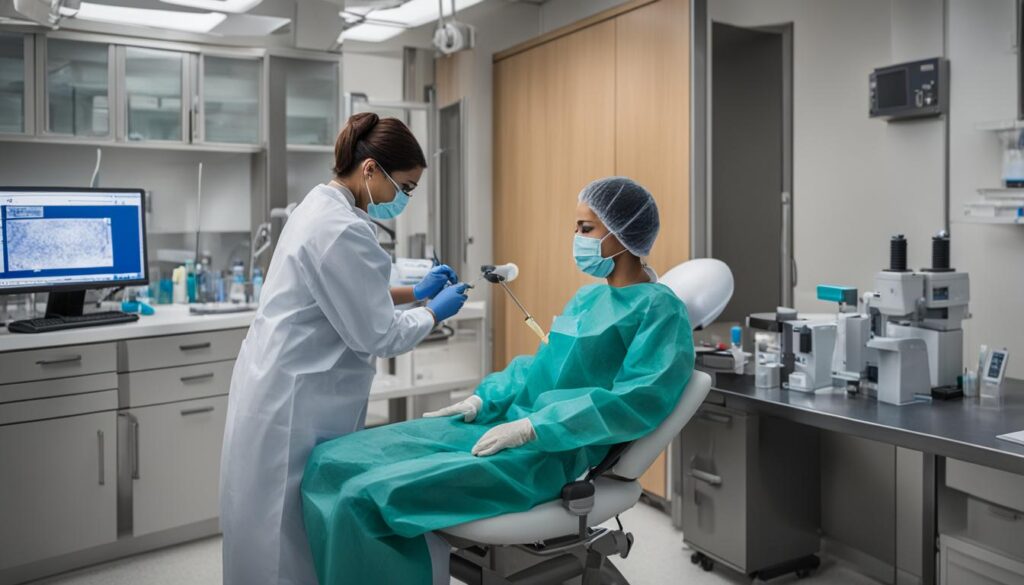
Understanding Mold Allergies: Symptoms & Relief
Welcome to our comprehensive guide on understanding mold allergies. If you or someone you know experiences mold allergy symptoms, it is essential to have a clear understanding of the condition. Mold allergies can cause significant discomfort and affect your overall well-being. In this article, we will explore the symptoms, treatment options, and preventive measures for mold allergies.
Key Takeaways:
- Mold allergies can lead to symptoms such as sneezing, coughing, itchy eyes, and skin rashes
- Diagnosing mold allergies may involve skin prick tests and blood tests
- Treatment options for mold allergies include medication-based approaches and natural remedies
- Preventing mold allergies involves maintaining indoor air quality and implementing effective ventilation and humidity control strategies
- Consider seeking professional assistance for mold assessments, prevention, and remediation
What Are Mold Allergies?
When it comes to allergies, mold allergies are a specific type that can cause discomfort and distress for individuals who are sensitive to mold spores. Mold allergies occur when the immune system overreacts to the presence of mold in the environment, causing an allergic reaction.
Mold allergies are different from other types of allergies, such as pollen or pet dander allergies, as they are specifically triggered by exposure to mold. Mold is a type of fungus that thrives in damp and humid environments, and it can be found both indoors and outdoors. When mold spores are inhaled or come into contact with the skin of individuals with mold allergies, it can lead to a range of symptoms.
Mold allergies occur when the body’s immune system mistakenly identifies mold spores as harmful substances and releases chemicals to fight against them. This immune response results in the symptoms that individuals with mold allergies experience.
So, how can you identify if you have mold allergies? Paying attention to the specific symptoms associated with mold allergies can help you determine if you are experiencing an allergic reaction to mold.
Common Mold Allergy Symptoms
- Sneezing: Sneezing is a common symptom experienced by individuals with mold allergies. It is often accompanied by a runny or stuffy nose.
- Coughing: Coughing can occur as a result of the irritation caused by mold spores in the respiratory system.
- Itchy Eyes: Itchy, red, and watery eyes are another common symptom of mold allergies. This is often accompanied by eye fatigue and irritation.
- Skin Rashes: Some individuals with mold allergies may develop skin rashes or hives upon exposure to mold spores.
Mold allergy symptoms can vary in severity from mild to severe, and they can differ from person to person. It’s important to note that mold allergies can also exacerbate existing respiratory conditions, such as asthma. If you suspect that you have mold allergies, it is recommended to consult with a healthcare professional for an accurate diagnosis and appropriate treatment.
Next up, we’ll explore the diagnostic methods used to identify mold allergies and discuss the various treatment options available for managing mold allergy symptoms.
Common Symptoms of Mold Allergies
Individuals with mold allergies can experience a range of symptoms when exposed to mold spores. These symptoms can manifest in both respiratory and non-respiratory systems, causing discomfort and distress. Understanding the common mold allergy symptoms is crucial in identifying and managing allergic reactions effectively.
Respiratory Symptoms
Mold spores can easily enter the respiratory system, triggering various respiratory symptoms in individuals with mold allergies. These symptoms may include:
- Sneezing
- Coughing
- Runny or stuffy nose
- Shortness of breath
- Wheezing
When exposed to mold spores, the respiratory system reacts with inflammation, leading to these symptoms. It’s important to note that these symptoms can worsen in damp or mold-infested environments.
Non-Respiratory Symptoms
In addition to respiratory symptoms, individuals with mold allergies may also experience non-respiratory symptoms. These symptoms can affect various parts of the body and may include:
- Itchy and watery eyes
- Skin rashes or hives
- Headaches
- Fatigue
- Difficulty concentrating
The non-respiratory symptoms of mold allergies are often a result of the immune system’s response to mold spores. These symptoms can vary in severity and may impact an individual’s daily life and overall well-being.
Exposure to mold spores can cause a range of symptoms, from respiratory issues like coughing and sneezing to non-respiratory problems like itchy eyes and skin rashes. Identifying these symptoms is crucial in recognizing an allergic reaction to mold and seeking appropriate treatment.
By understanding the common symptoms of mold allergies, individuals can take proactive steps to minimize their exposure to mold spores and seek appropriate treatment to manage their allergy effectively.
Diagnosing Mold Allergies
In order to accurately diagnose mold allergies, various methods and procedures can be employed to determine if an individual is allergic to mold. Allergy testing is a crucial step in the diagnostic process and provides valuable insights into a person’s allergic reactions. Two common types of allergy testing for mold allergies include:
- Skin prick tests: This type of test involves introducing small amounts of mold allergens into the skin by pricking the surface. The presence of a localized allergic reaction, such as redness and swelling, indicates a positive response to the allergen.
- Blood tests: Blood tests, such as the enzyme-linked immunosorbent assay (ELISA) or radioallergosorbent test (RAST), measure the levels of specific antibodies, such as Immunoglobulin E (IgE), in the blood. Elevated levels of these antibodies indicate an allergic reaction to mold.
By utilizing these diagnostic tools, healthcare professionals can accurately determine if individuals have mold allergies and tailor treatment plans and preventive measures accordingly.
Understanding the results from mold allergy testing is essential in ensuring effective management of mold allergies and minimizing exposure to mold allergens.
“Allergy testing allows healthcare professionals to identify the specific allergens that trigger allergic reactions. This knowledge is crucial in developing personalized treatment plans and preventative strategies.”
– Dr. Emma Thompson, Allergy Specialist
In addition to these diagnostic tests, medical professionals may also consider a detailed medical history, physical examination, and evaluation of symptoms to establish a comprehensive diagnosis. These assessments, combined with allergy testing, provide a thorough understanding of an individual’s mold allergy profile.
| Allergy Testing Methods | Description |
|---|---|
| Skin prick tests | Small amounts of mold allergens are pricked into the skin to observe localized allergic reactions. |
| Blood tests | Measures the levels of specific antibodies in the blood to determine the presence of mold allergies. |
By employing these diagnostic techniques, medical professionals can develop individualized treatment plans and preventive strategies that effectively alleviate mold allergy symptoms and improve overall quality of life.

Treating Mold Allergies
When it comes to managing mold allergies, there are various treatment options available that can help alleviate symptoms and provide relief. These treatments can be divided into medication-based approaches and natural remedies, offering individuals flexibility in finding the most suitable solution for their specific needs.
Medication-Based Approaches
In many cases, medication is the go-to method for treating mold allergies, especially when symptoms are moderate to severe. The following are common types of medication prescribed to provide relief:
- Antihistamines: These medications work by blocking histamine, a chemical released during an allergic reaction. Antihistamines can help relieve sneezing, itching, and a runny nose.
- Nasal Sprays: Corticosteroid nasal sprays can help reduce inflammation in the nasal passages and relieve congestion caused by mold allergies.
- Decongestants: Decongestant medications can help temporarily relieve nasal congestion, making it easier to breathe.
It is important to consult with a healthcare professional to determine the most appropriate medication and dosage for individual needs and medical history.
Natural Remedies
In addition to medication-based approaches, there are also natural remedies that can provide relief from mold allergy symptoms. These remedies focus on supporting the immune system and reducing exposure to mold. While natural remedies may not work for everyone, they can complement traditional treatment methods. Some popular natural remedies for mold allergies include:
- Nasal Irrigation: Using a saline solution or a neti pot can help flush out allergens from the nasal passages, reducing congestion and relieving symptoms.
- HEPA Filters: High-efficiency particulate air (HEPA) filters can effectively remove mold spores and other allergens from the air, improving indoor air quality and reducing allergy symptoms.
- Quercetin: Quercetin is a natural flavonoid found in certain foods, such as onions, apples, and berries. It possesses anti-inflammatory properties and may help reduce allergic reactions.
It is important to note that while natural remedies may help alleviate symptoms, they are not a substitute for medical advice and should be used in conjunction with proper medical treatment.
To determine the most suitable treatment option, it is recommended to consult with a healthcare professional who specializes in allergies. They can provide personalized guidance based on individual needs and provide the best course of action to achieve mold allergy relief.

Preventing Mold Allergies
To minimize your exposure to mold and prevent allergic reactions, it is crucial to implement effective preventive measures. By taking proactive steps to maintain proper indoor air quality, identify and remove mold sources, and control ventilation and humidity levels, you can significantly reduce the risk of mold allergies.
1. Maintain Proper Indoor Air Quality
To prevent mold growth and minimize allergen exposure, it’s important to ensure good indoor air quality. Here are some tips to accomplish that:
- Regularly clean and vacuum your home to remove dust, dirt, and potential mold spores.
- Use air purifiers or HEPA filters to capture airborne particles, including mold spores.
- Keep windows and doors closed during high pollen or mold seasons to prevent outdoor allergens from entering your home.
- Avoid using humidifiers excessively, as high humidity can promote mold growth. Maintain indoor humidity levels between 30-50%.
2. Identify and Remove Mold Sources
To effectively prevent mold allergies, it’s crucial to identify and remove any existing mold sources in your home. Regular inspections and maintenance can help you detect and address these issues. Consider the following:
- Check common areas prone to mold growth, such as bathrooms, basements, and kitchens, for any signs of mold or moisture problems.
- Repair any leaks or water damage promptly to prevent mold growth.
- Clean and dry any wet or damp areas within 24-48 hours to prevent mold colonization.
- Consider using mold-resistant materials in moisture-prone areas, such as mold-resistant drywall or paint.
3. Implement Effective Ventilation and Humidity Control Strategies
Proper ventilation and humidity control are key factors in preventing mold growth and reducing mold allergy risks. Consider the following strategies:
- Ensure proper ventilation in bathrooms, kitchens, and other humid areas by using exhaust fans or opening windows when cooking or showering.
- Use dehumidifiers in areas with high humidity levels to maintain optimal moisture control.
- Regularly clean and maintain your HVAC system to minimize mold growth and improve air circulation.
By following these preventive measures, individuals with mold allergies can significantly reduce their exposure to mold and alleviate allergic reactions. Remember, early prevention is key to long-term relief and improved respiratory health.
| Preventive Measures | Description |
|---|---|
| Maintain Proper Indoor Air Quality | Regular cleaning, use of air purifiers, and maintaining appropriate humidity levels. |
| Identify and Remove Mold Sources | Regular inspections, prompt repairs of leaks, and proper cleaning and drying of wet areas. |
| Implement Effective Ventilation and Humidity Control Strategies | Using exhaust fans, dehumidifiers, and proper maintenance of HVAC systems. |
Professional Mold Assessments, Prevention, and Remediation
When it comes to dealing with mold-related issues, it’s crucial to entrust the task to professionals who have the expertise and experience to ensure effective assessments, prevention, and remediation. That’s where Fix Mold Miami comes in. As Florida’s highest-rated company specializing in mold services, they offer comprehensive solutions to help homeowners and businesses tackle mold problems head-on.
Fix Mold Miami is dedicated to providing top-notch mold assessments to identify the root cause of mold growth and determine the best course of action for remediation. Their team of experts utilizes advanced tools and techniques to conduct thorough inspections, ensuring that no mold issue goes unnoticed. With their in-depth knowledge of mold types and their growth patterns, they can accurately assess the severity of the problem and develop a tailored action plan.
Prevention Strategies
In addition to assessments and remediation, Fix Mold Miami also offers effective prevention strategies to help individuals and businesses maintain a mold-free environment. Their expert team will provide valuable insights and recommendations on how to mitigate the risk of mold growth and recurrence in the future. By implementing these preventive measures, clients can significantly reduce the chances of mold-related issues, ensuring the health and safety of their property and occupants.
“At Fix Mold Miami, we understand the importance of a comprehensive approach to mold management. That’s why we not only focus on remediation but also prioritize prevention to ensure a long-term solution. Our team of professionals is equipped with the knowledge and tools necessary to address mold-related problems effectively.”
Remediation Services
Fix Mold Miami’s remediation services are designed to eliminate existing mold infestations, restore healthy indoor air quality, and create a safe living or working environment. Their skilled team follows industry-leading practices and guidelines to safely and efficiently remove mold, preventing its spread and minimizing any potential health risks. They utilize specialized equipment and techniques to ensure thorough and effective remediation, leaving no trace of mold behind.
With their exceptional track record and commitment to customer satisfaction, Fix Mold Miami has become a trusted name in the mold industry. Their team of certified professionals delivers exceptional service while prioritizing client needs and requirements. Whether it’s a residential property, commercial building, or any other structure, Fix Mold Miami is dedicated to providing reliable mold assessments, prevention strategies, and remediation services.
If you’re experiencing mold issues or want to prevent mold growth in your property, contact Fix Mold Miami today. Their friendly and knowledgeable staff will be more than happy to assist you in addressing your mold-related concerns. Ensure the health and safety of your property by partnering with the experts in mold assessments, prevention, and remediation.
- Phone: +1-xxx-xxx-xxxx
- Email: info@fixmoldmiami.com
- Website: www.fixmoldmiami.com
Conclusion
In conclusion, understanding and addressing mold allergies is crucial for individuals who suffer from this condition. By recognizing the symptoms associated with mold allergies, individuals can take the necessary steps to seek appropriate treatment. Whether it’s through medication-based approaches or natural remedies, finding relief from mold allergy symptoms is essential for maintaining a good quality of life.
Additionally, implementing preventive measures to minimize exposure to mold is key in managing mold allergies in the long term. This can be achieved by maintaining proper indoor air quality, identifying and removing mold sources, and implementing effective ventilation and humidity control strategies.
For professional assistance in mold assessments, prevention, and remediation, Fix Mold Miami is the leading expert in the field. Their specialized services can help individuals deal with mold-related issues and create a healthier living environment. Interested readers can contact Fix Mold Miami for further information and assistance.
In conclusion, by understanding mold allergies, recognizing the symptoms, seeking appropriate treatment, and taking preventive measures, individuals can effectively manage and alleviate mold allergy symptoms, leading to a healthier and more comfortable life.




